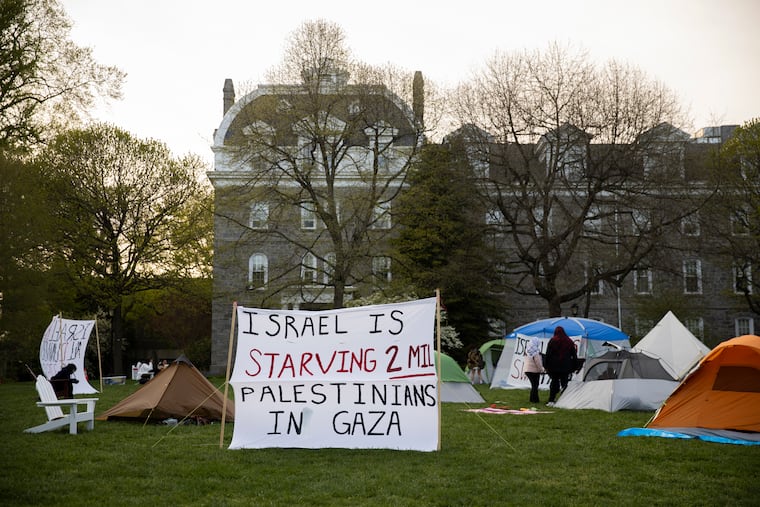Swarthmore College’s pro-Palestinian encampment disbands after 4 weeks and stalled negotiations
Student activists began voluntarily clearing the encampment on Parrish Lawn Thursday morning.

Swarthmore College’s pro-Palestinian encampment officially came down Friday morning, marking the end of the longest campus protest over the war in Gaza in the Philadelphia area.
About three dozen student activists began packing up their belongings from Parrish Lawn voluntarily Thursday, said organizer Ragad A., a sophomore, who declined to share their full name out of privacy concerns.
No police or public safety officers were involved, confirmed Swarthmore College spokesperson Alisa Giardinelli. “The few remaining students voluntarily left the lawn sometime overnight,” she said.
The dismantling of Swarthmore’s encampment marks the end of a wave of demonstrations on campuses in the Philly region, as protesters across the United States have demanded that colleges and universities divest their endowments from entities profiting off the war, which the Palestinian Health Ministry estimated has resulted in over 35,000 deaths since Oct. 7.
Swarthmore’s encampment began over a month ago and its prolonged existence on Parrish Lawn — where commencement is typically hosted — forced the liberal arts college to move the celebration off campus to the Mann Center for the Performing Arts in Fairmount Park for the first time in school history.
» READ MORE: Swarthmore College will hold commencement off campus for first time since its founding in 1864
That decision is firm, said Giardinelli, even though the encampment was dismantled before Sunday’s ceremony.
“Given the complexity of the arrangements, we are past the point when we could make a change to the location,” Giardinelli said.
Ragad said the decision to pack up largely had to do with safety: Three weeks into the demonstration, on May 17, a group of counterprotesters launched fireworks toward the encampment and threatened to attack it, according to an Instagram post from Swarthmore’s Students for Justice in Palestine chapter.
Then, on May 22, 25 student activists received disciplinary notices for participating in pro-Palestinian demonstrations throughout the school year, not limited to the encampment. Ragad was among them.
The infractions varied, said Ragad, from “disrupting talks and events to postering.” Students participating in the encampment were threatened with interim suspensions and the loss of summer funding for research opportunities and housing, according to an Instagram post on May 20 showing an email from Swarthmore’s vice president of student affairs addressed to “Swarthmore SJP and allies.”
“This week, a number of students received letters notifying them of possible disciplinary charges for conduct that occurred between October 2023 and March of this year. These are independent of activity related to the encampment,” Giardinelli confirmed.
» READ MORE: What is divestment? And why do college students want it?
Ragad said the notices came after 16 hours of negotiations with Swarthmore administrators — including co-presidents Rob Goldberg and Tomoko Sakomura — that had devolved into a stalemate.
Swarthmore administrators had said “they would never agree to divestment, not within this negotiation process or future ones,” said Ragad, who was present for these conversations. Still, the college seemed at first amenable to establishing an “ethical investments committee” and a scholarship for students at risk in Gaza, where no universities remain.
That changed when administrators refused to issue a statement denouncing the scholasticide, or the systemic dismantling of Gaza’s education system. From there, Ragad said, the college walked back the investments committee to a nonbinding subcommittee, and the promise to develop a scholarship to a vow to “explore” one.
“Nothing has changed regarding negotiations,” said Giardinelli, who pointed to a May 16 letter from Sakomura and Goldberg that charged student organizers with creating “a threatening, intimidating environment” that “went beyond a reasonable definition of peaceful protest” as talks broke down.
» READ MORE: Pro-Palestinian encampment is cleared at Drexel University
“We feel incredibly proud that we did not accept anything less than what we believe in,” said Ragad.
Swarthmore’s encampment was the last remaining pro-Palestinian campus protest in the Philadelphia area, and the longest running. The University of Pennsylvania’s weeks-long demonstration was dismantled in early May, a day after Gov. Josh Shapiro demanded the university “restore order.” Thirty-three people had been detained — including nine students — and Penn has since sent letters banning 24 nonstudents from campus.
Protesters at Drexel University also abandoned their encampment after six days in the Korman Family Quad on Thursday, when dozens of police officers rolled up on bikes and asked them to pack up.
More than 2,900 people have been arrested on campuses nationwide for participating in pro-Palestinian encampments, according to a tracker from the New York Times, as universities let campus, city, and state police use varying degrees of force.
Some colleges and universities, however, were able to reach compromises with student organizers, including Rutgers University, where president Jonathan Holloway on Thursday defended his decision to review divestment demands and establish an Arab Cultural Center in front of Congress.
» READ MORE: Testifying before Congress, Rutgers president defends decision to negotiate agreement with pro-Palestinian protesters
“We feel empowered,” Ragad said. “We built a community.”
Staff writer Susan Snyder contributed to this article.